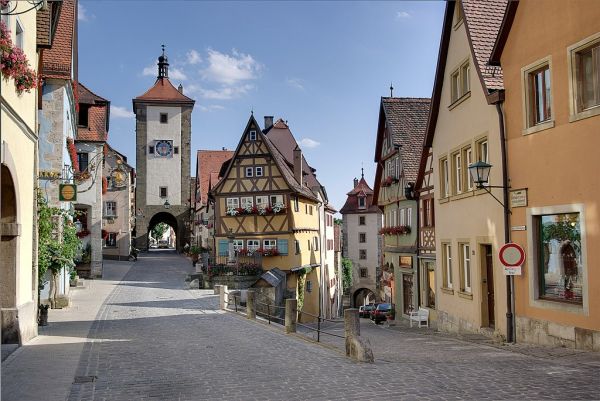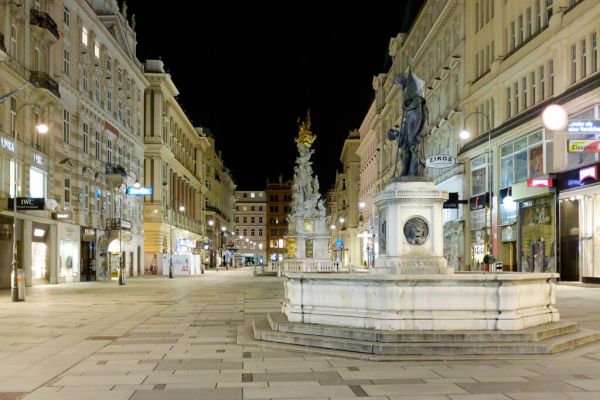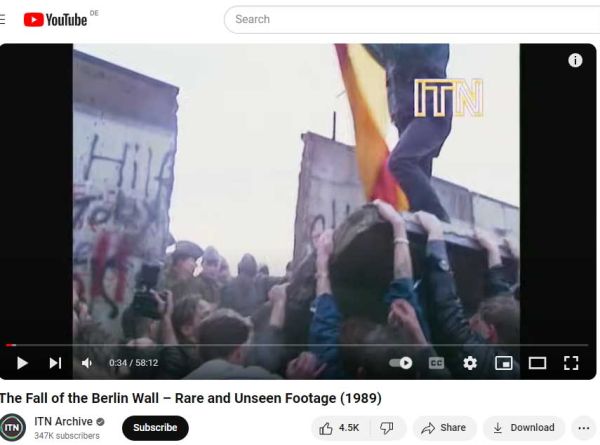A Change in Personal Orientation is Difficult
A Change in Personal Orientation

Rothenburg ob der Tauber (Berthold Werner, photographer)
I guess I am an atypical American. When I was in college, I befriended several students who had spent a semester studying in Germany and Austria. Most of them could speak German to some degree and also had an interest in art, history, and architecture. I enjoyed listening to them recount their experiences over there and knew that, when I finished college, I wanted to travel to Germany and Austria, too.

Vienna, der Graben (Fuji-User, photographer)
The real pleasure would have been to travel to East Germany and visit Erfurt, the hometown of my great-great-grandfather, who emigrated to America in about 1820. I actually sent off for tourist information about travelling there, but the police-state mentality that dictated the terms of my visit discouraged me and forced me to put my plan on hold. As it turned out, I had to wait nine years after the Berlin Wall fell before I could travel there.
The Wall came down spectacularly in November of 1989. It signalled the end of East Germany's Soviet administration, and eventually the end of the Soviet Union, itself. The archival footage of joyous East Germans pouring through the Brandenburg Gate represents one of the enduring images of my lifetime. The resulting problem, however, is that many East Germans stayed in the West.

Erfurt, Fischmarkt (Tom Kidd, photographer)
I visited Erfurt for the first time during the Summer of 1998. Since the Wall had come down nine years earlier, certain realities had settled on the people of former East Germany, among them the feeling that they had lost their own nation and become the poor cousins of the victorious West Germans. East Germans had listened to Soviet propaganda for fifty years preach a socialist revolution. Now they needed a new faith, a new landscape of functional beliefs. To make it worse, they had to reach outside the realm of their personal experience to find it, which is hard to do. Without personal orientation, listening to someone talk about a freedom-loving society was hardly more than an academic exercise.
Besides changing the political and economic world-view of East Germans, the West had to overhaul the rail system, modernize the utilities, pass out Western currency, and tell East Germans that money had a far greater significance than it had had under the Soviet concepts. Engineers from the West assessed the industrial infrastructure of the East and reported that it had little value beyond its weight as scrap-metal.
Much of the population had to deal with unemployment, and a sense of disillusionment set in. In 1999, Erfurt's newspapers reported that the maternity hospital had recorded the least number of births on record, a clear sign of Erfurters' uncertainty about the future. Happily, within a few years, it appeared to this American visitor that nearly every woman on the street was pushing a pram--a clear sign that the necessary details of unification had taken place.
But during the Summer and Fall of 1998, the lost, hardened expressions of the people concerned me. It reminded me of a quote from Eric Hoffer's True Believer. He said that, if you give freedom to people before they can benefit from it, you can only "release them to the freedom of their own impotence"; so the West needed to change their personal orientation, first.
I remember one incident especially well. I watched construction-workers renovating an old house and foolishly took out my camera to photograph them. They froze with fear, and I had to assure them, "Ich bin Amerikaner!" They waved and went back to work. Possibly, they suspected that I worked for the Stasi, the hated secret police, and that I might report them for speaking heresies against the Socialist State.
I wanted to tell them that the East German Soviet State had passed out of existence; but they could have replied cynically, "That's what you say!" And if the East German State did come back to life, they would shrug their shoulders and go back to it, just to fill the ideological vacuum. All of that Berlin-Wall hoopla for nothing!
The question remains, how do you teach a people that has known nothing but terror, submission, and indoctrination for the previous fifty years that individual freedom creates a better society because it releases them from collective inertia, gives them a vehicle for volitional thinking, and allows their brains to process interesting "What-if?" type questions?
But truthfully, every society deals with these issues, even the ones that claim to be free.

